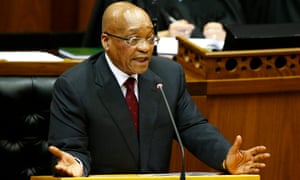South Africa’s president, Jacob Zuma, has denied acting dishonestly during a long-running scandal over improper state spending at his private home, Nkandla, the day after a scathing constitutional court ruling on the saga.
South Africa’s top court ruled that Zuma had failed to uphold the constitution when he ignored a state order to repay some of the government funds used in an £11m upgrade to his private residence, including a swimming pool and amphitheatre.
The court also ruled that parliament, which is dominated by the ruling African National Congress, had failed in its obligations by not holding Zuma to account.
In what will be a costly judgment for Zuma in financial and political terms, the constitutional court ordered that he must personally pay back the cost of those improvements to Nkandla that were not essential for security, including a cattle enclosure, a visitor centre and a chicken run.
In a Friday evening address to the nation, Zuma said his response to a report by public protector Thuli Madonsela ordering him to repay some of the money was “in good faith” but based on unsound legal advice.
“I wish to emphasise that I never knowingly or deliberately set out to violate the constitution,” Zuma said.
“Any action that has been found not to be in keeping with the constitution happened because of a different approach and different legal advice,” he said, before issuing an apology for the “frustration and confusion” caused by the scandal.
He said he would abide by the court ruling and now pay back the funds.
Opposition parties, who have been calling for the 73-year-old to resign, dismissed his pronouncements as misleading. Leaders of his ruling ANC were also due to hold a news conference on Friday night.
The opposition has launched impeachment proceedings against Zuma but these are unlikely to be successful because of the ANC’s strong majority in parliament.
However, some South Africans believe the scandal could still bring down the leader by persuading some in the ANC to abandon him.





